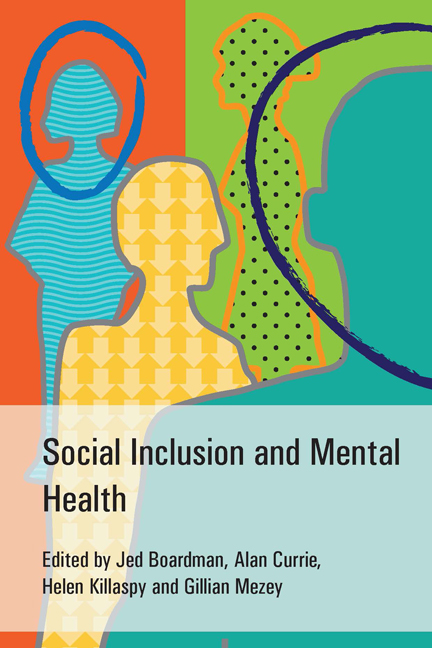Book contents
- Frontmatter
- Contents
- List of contributors
- List of tables
- Foreword
- Preface
- Acknowledgements
- Scoping Group on Social Inclusion, Royal College of Psychiatrists
- Part 1 What is social exclusion?
- 1 Introduction
- 2 Concepts of social exclusion
- 3 Social exclusion of people with mental health problems and learning disabilities: key aspects
- 4 Policy and social exclusion
- 5 How is social exclusion relevant to psychiatry?
- 6 Socially inclusive working across the psychiatric subspecialties
- Part 2 Social exclusion: the scope of the problem
- Part 3 Working towards inclusive psychiatry
- Index
3 - Social exclusion of people with mental health problems and learning disabilities: key aspects
from Part 1 - What is social exclusion?
- Frontmatter
- Contents
- List of contributors
- List of tables
- Foreword
- Preface
- Acknowledgements
- Scoping Group on Social Inclusion, Royal College of Psychiatrists
- Part 1 What is social exclusion?
- 1 Introduction
- 2 Concepts of social exclusion
- 3 Social exclusion of people with mental health problems and learning disabilities: key aspects
- 4 Policy and social exclusion
- 5 How is social exclusion relevant to psychiatry?
- 6 Socially inclusive working across the psychiatric subspecialties
- Part 2 Social exclusion: the scope of the problem
- Part 3 Working towards inclusive psychiatry
- Index
Summary
Throughout this book the central characteristic of social exclusion is seen as the non-participation of people in the key activities of society. This allows us to examine what factors affect social exclusion, its scope, and the evidence for its extent. Many people working in mental health and learning disability services will recognise that disadvantage and exclusion from participation are common experiences for users of services and that reducing these aspects of social exclusion can bring about significant improvements to their lives. In this chapter we expand upon these and outline how these might help us to understand their application to people with mental health problems and learning disabilities.
Social exclusion and mental health problems
What we are concerned with here are the concepts associated with social exclusion that are useful in providing a means of understanding the importance of the links between exclusion and mental health problems or learning disability. These are summarised in Box 3.1.
Concepts and applications
The concept of social exclusion has been applied to a range of specific groups, including people who are unemployed, single parents, the homeless, refugees and asylum seekers, and people living in deprived areas. It has also been extended to people with disabilities (Blaxter, 1980; Martin & White, 1988) and thus includes people with mental health problems and learning disabilities. People from specific social identity groups (e.g. women, people from Black and minority ethnic groups, gay and lesbian people) who also have mental health problems are likely to experience social exclusion (Chapter 9).
As a relative concept, an analysis of social exclusion can be applied to the UK in the 21st century and to those with mental health problems and learning disabilities who live in the UK. Further to this, the analysis of exclusion and its associated concepts can help to develop a vision for society and mental health services in the future. It can also help us view the historical changes that have occurred in mental health services and the position of people with mental health problems and learning disabilities in society.
The ideas of social exclusion are based on concepts of poverty and deprivation, but represent an extended concept which can be readily applied to disability and its multifactorial causal components that relate to social exclusion.
- Type
- Chapter
- Information
- Social Inclusion and Mental Health , pp. 22 - 45Publisher: Royal College of PsychiatristsFirst published in: 2017



